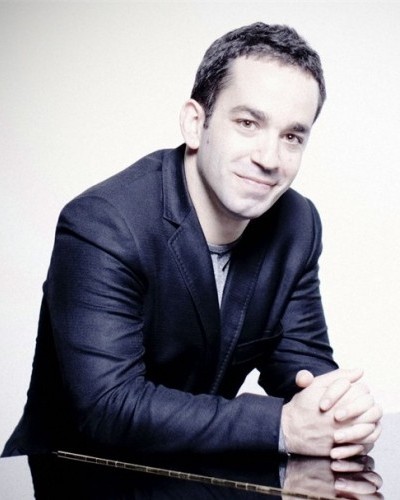Barnatan shows top-flight artistry in Barber and Schubert
The Harris Theater has long been home for Music of the Baroque and Chicago Opera Theater yet this season the downtown venue seems to be increasing its classical offerings nearly exponentially. In addition to an expansion of concerts by the Chamber Music Society of Lincoln Center, last month’s first “Beyond the Aria” program was a great success. And next month the Harris will present Rossini’s complete opera Guillaume Tell in a concert performance with Gianandrea Noseda leading the Teatro Regio Torino.
On Monday night the Harris Theater offered a more intimate evening with a recital by pianist Inon Barnatan. The event generated sparse attendance by Harris standards, yet there was nothing disappointing about Barnatan’s artistry, which was stellar throughout. The Israeli pianist took a decidedly informal approach, sitting on his piano bench and introducing each work with brief yet on-point comments.
One could call the first half of his program “The Art of Fugue,” offering three works with firmly contrapuntal elements. Bach’s Toccata in E minor led off, with Barnatan’s free rubato in the introduction and adagio sections showing a romantic sensibility that was unapologetically (and refreshingly) retro. Yet the fugal section went with fine dexterity and bracing articulation, even if the Steinway sound proved rather metallic and murky on the right side of the hall. (A move to the left at intermission provided a much clearer sonic image.)
Cesar Franck venerated Bach, and his Prelude, Choral et Fugue made a logical progression. If Barnatan’s Bach was richly expressive, his Franck was straightforward and transparent, underlining the dark-hued Prelude, building the central chorale theme with inexorable strength and drawing out the multiple lines and triumphant bell-ringing of the fugal coda.
In his spoken remarks, Barnatan said he believes Samuel Barber’s Piano Sonata to be one of the “best and most important” sonatas of the 20th century and not just among works by American composers.
Certainly, his committed performance of Barber’s Op. 26 made the strongest possible case. Edgy and acerbic, Barber’s Piano Sonata inhabits vastly different terrain than the nostalgic lyricism of the composer’s Adagio for Strings and Violin Concerto. Barnatan firmly punched out the driving dissonance of the densely woven first movement, nicely balancing the spare searching disquiet of the more restrained sections. He tossed off the quickly cascading runs of the ensuing second movement with an apt light touch.
Barnatan was clearly in synch with the pensive passacaglia of the Adagio, building to a forceful climax and descending again. The final movement—dashed off by Barber in a fury after Vladimir Horowitz’s wife chided the composer for being late with her husband’s commission—is one of the composer’s finest achievements: a fast, furious tour de force. The pianist attacked the surging, aggressive bursts, crashing chords and jazz syncopations with thrilling fire and virtuosity.
The second half was given over entirely to Schubert’s sprawling Piano Sonata in A major, D.959, the sunniest of the composer’s final triumvirate of sonatas. Barnatan showed a keen grasp of architecture in this 40-minute work, charting the amiable main theme of the vast opening Allegro with a wonderful singing line and yielding touch. Time and again he unfolded the music like a master storyteller, each phrase leading the listener on to the next episode.
The stately introspection of the Andantino was rendered with a relaxed gentle poise that felt just right. Yet Barnatan brought full-metal ferocity to the jarring central section as the unhinged music spins wildly out of control.
Barnatan’s Scherzo returned us to earth with its skipping, light-hearted bonhomie. In the Allegretto finale, the pianist drew all the threads together masterfully, wedding the confiding, warmth of the main theme with the sudden segues into minor-key agitation, the pauses between reprised fragments like a faltering memory attempting to aright itself.
This was truly world-class Schubert playing, and Barnatan richly deserved the enthusiastic ovation. In his encore of Mendelssohn’s Rondo Capriccioso, the pianist underlined the Schubertian influence of the opening section, gave the leggiero “fairy music” section effervescent articulation, and delivered daunting power and speed in the knuckle-busting coda.
Posted in Uncategorized



Posted Nov 04, 2014 at 3:16 pm by Nancy Montei
I agree wholeheartedly. This was piano playing at its finest. Too bad more people didn’t attend. Mr. Barnatan will be returning to the Harris Theatre on November 17 with the Chamber Music Society of Lincoln Center.